Teen Goes to Extraordinary Lengths to Give Autistic Twin a High School Graduation to Remember6/25/2015  Aly and her brother crossing the stage during graduation Aly and her brother crossing the stage during graduation A teenager has earned herself an army of fans after she finally reached her goal to help her severely autistic twin brother across the stage at their high school graduation. Anders Bonville, 18, from Birmingham, Alabama, was diagnosed with autism when he was two, which left him non-verbal but – along with his sister, Aly – the pair developed their own unique language and set out to alter perceptions of the condition. When the siblings first started school, Aly told AutismSpeaks how the other children in their class excluded Anders because he was “different.” She remembered: “Having grown up with Anders, I couldn’t imagine not having him be part of classroom activities and so my mother and I made sure to always introduce him to other students and have him give them high-fives. “Then, they would realized that – even though Anders has autism and couldn’t talk to them and made weird noises – he was just a kid like they were.” There was a brief period when the pair was separated, for the first time ever, when Anders attended a different school: “Although I was sad,” said Aly, “I realised I could still help Anders be included in his classroom at the other school.” Aly with her brother, Anders, and the pair's mother, Benida When the other pupils became more curious about Anders and his likes and dislikes, Aly had to explain that he could only vocalise – and not actually speak – so she created an ‘Ask Aly’ box so that the other kids could submit questions about her brother. She said: “The most important thing, besides educating these fifth-graders about special needs, was that it really humanised my brother. “He would get to be a part of the classroom and would carry the box to them every day and interact with them while they submitted their questions, It made Anders a part of the classroom and made students more accepting of him.” When the pair was finally reunited at Oak Mountain High School, Aly began to think about graduation almost straight away. “I quickly realized that my imagination included Anders walking with me at graduation and I began to think of a way to have him there next to me,” she said.“For my mother and I, it was never a matter of ‘if’ Anders would walk with me at graduation.”
As the big day drew nearer, Aly signed up for a cap and gown and registered for her own diploma and well as her brother’s – but she kept it secret from her family and friends. Working closely with her teachers, though, she took into account the many things that could possibly go wrong: “Was he going to be mad, was he going to be content, would he be vocalising, would he be having a break down? All of these things were going through my head and I had a plan for each one in case something did not go as planned.” Aly was called first on-stage to receive her diploma. With her brother being walked quietly behind a curtained area in his wheelchair to keep him calm, she quickly exited to get him before his name was called out. Aly zoomed down the hallway with her brother in his wheelchair so that he would be happy when the big moment came. Although the principal had ordered the audience to hold all applause until the end – the moment Aly took her brother’s hand and led him across the stage – the entire hall rose to its feet and erupted into applause – including the principal herself. Original article HERE!
0 Comments
James is a special needs student who is an easy target for bullies, but five boys are on a mission to put an end to it. They promise to protect James from bullying, but what they end up doing goes way beyond that. Their camaraderie and friendship provides James with a new, bright outlook on life. Heck, it even gives me hope! Because of James’s learning disabilities, he’s forced to work in a different classroom than the rest of the kids his age. As a result, making friends is difficult. But the boys featured in the video below did not let James’s differences stand in the way of getting to know him. After seeing James get bullied, they vowed to never let it happen again. Please SHARE this heartwarming story with everyone you know! 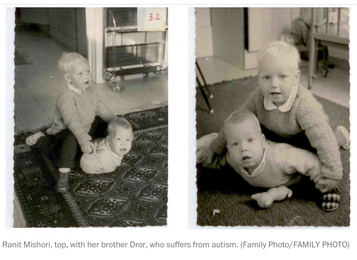 One of the least fun moments I recall from my years of growing up with an autistic brother was when he bit me on the cheek — just in time for my class photo. I was 12 and he was 11. I went into school with visible bite marks, and when they sat me in the chair for my solo shot, I told them that the cat had done it. That’s one of the bad stories. As for a good one . . . um, to be honest, I have a hard time coming up with much. I know that people are warmed by stories of siblings who selflessly shower the disabled child with love, attention and support. I think that’s great, too. And it’s for real for some siblings. But for many of us, relating to a sibling who is on the autism spectrum can be complicated. The challenges to a warm, close relationship are many. Normal sibling rivalry doesn’t work, because it can never be a fair fight. Here’s what siblings often are up against, particularly when a brother or sister has more severe autism: ●Missing out on typical family outings, such as movies, restaurants and vacations; ●Being embarrassed to bring friends home; ●Unpredictable and sometimes violent tantrums and outbursts aimed at you; ●Being expected to grow up faster than you may want to, because you need to be the “responsible one”; ●The sense that you come second to your parents, because so much of their time and energy is focused on the one with autism. These are all fertile ground for building resentment. And then feeling guilty about feeling resentment. Because, after all, even as youngsters, we do understand that our disabled sibling cannot help being disabled. A Dearth of Research The feeling that our needs come second is echoed in the small volume of research on how autism affects siblings. Understandably, most of the scientific focus goes to the child who has the condition. (One in 88 children in the United States has some form of autism, according to the Centers for Disease Control and Prevention.) At the same time, it should be remembered that at least twice as many children confront the problems of having a brother or sister on the spectrum, says Ryan Macks, a child psychologist at Cincinnati’s Children’s Hospital and one of the few researchers on sibling impact. A fair amount of research has been done on how autism impacts the family. Most of it, however, has focused on how parents are affected.What intrigued me — both as an autism sibling and as a family physician whose patients include autism siblings — was the dearth of studies looking specifically at the sibling relationship. Moreover, the small amount of research tends to center on issues of academic performance, mood disorders and social performance, and is far from conclusive. A 2006 review of the research in the Journal of Intellectual and Developmental Disability found that while some researchers were uncovering “deleterious outcomes,” others were finding siblings who were well adjusted or whose challenges were of “low magnitude and non-significant.” A 2007 Harvard Review of Psychiatry article echoes this, mentioning studies that document “distressing emotional reactions such as feelings of anxiety, guilt and anger” and “more adjustment problems” as well as research noting that “some siblings benefit from their experience, others seem not to be affected.” The studies used different methodology, but even so, the inconsistency perhaps should not be surprising. Just as no two people with autism are alike, no two siblings are alike in how they adapt to their family situation. A Big Adjustment According to Macks, there are some, like me, who can’t help but recall those years as mostly difficult, with a lingering sense of a childhood that was compromised. But he suggests that such an experience is neither typical nor inevitable, as some kids weather the challenges with composure, serenity and even the belief that a sibling’s autism was actually a positive factor in their lives. The data offer only a few hints at what might determine a sibling’s response to autism in the family. Some studies reported that siblings tend to do better in bigger families than smaller; in two-parent families rather than single-parent; in families where the autistic child’s functioning is higher rather than lower. There also can be better outcomes in families of more financial means. The Good Moments Duty and the burden of responsibility aside, Smith talks about some good moments with her brother. The key, she says, is being able to keep a sense of humor — to know there are times when laughter can replace anger. “A lot of it is really funny,” Claire says. “He does a lot of cute stuff.” She recalled a recent incident in which her brother, who is also deaf, was fixated on mopping the porch. He was outside, signing to himself the instructions he had just received from his father about the chore. She chose to find his behavior funny instead of embarrassing, and to appreciate the moment. “I don’t think there are any siblings,” she says, “who can laugh at their brother having a conversation with himself and a mop.” Beyond such little moments, researchers — and some siblings themselves — are discovering that the sibling experience can produce long-term benefits. Some studies report that people who grew up with autism in the house tend to be more empathetic. “They are often able to handle difficult situations later in life. They’ve learned how to handle embarrassing situations in public; they’ve learned how to handle negotiations better,” Macks says. In fact, in stable families with “no demographic risk factors” such as a one-parent household or economic issues, Macks says, “by and large, having a sibling with autism is extensively viewed as a very positive experience, with limited long-term negative impact.” Basu and Smith agree. “I feel more responsible . . . know what it’s like to take care of someone to some degree,” Smith says. “I feel I am a little more patient than some of my friends.” Adds Basu: “It helped me become more mature” more quickly. Despite the challenges — and there are many — neither would change anything if they could. As Smith puts it: “Wishing him different is wishing him away. And I don’t want to wish him away.” This is a point Macks wants to emphasize: “Most siblings of children with autism or any other type of disability wind up doing just fine.” He believes that there is a misconception that having an autistic sibling sentences a child to “a whole range of intense struggles throughout your life.” That is not necessarily true, he says. “The majority will handle the situation quite well.” As we adjust to absorbing into our community all of the kids with autism and strive to support their unique educational, vocational and medical needs, I’d say let’s not forget the siblings, however well adjusted they may seem. Their needs must not be overlooked by parents, teachers, therapists, doctors and researchers. As for myself — now the generally well-adjusted adult sibling of a 45-year-old autistic man — the challenges are evolving. I suspect they also evolve for Smith, Basu and many others. To read the full article click HERE 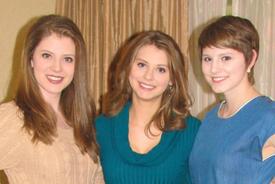 By: Cynthia A. Moore, M.D., Ph.D., Director, Division of Birth Defects and Developmental Disabilities, National Center on Birth Defects and Developmental Disabilities (CDC) About 1 in 68 children has been identified with autism spectrum disorder (ASD). The ‘1’ in 1 in 68 is more than just a number—it represents many families in communities across the United States living with the condition. Alexis Wineman, the first woman with ASD to participate in the Miss America competition, feels that her family, and particularly her siblings, has always been a source of strength and inspiration for her. “Prior to being diagnosed with autism, neither I nor my family had an explanation for my meltdowns and other issues. After the diagnosis, it was incredible how my siblings reacted … it was just amazing how they sprang into action after years of not knowing what was going on.” Her family shared their advice for others who have a sibling with ASD. “My advice for someone who has a sibling with autism would be to engage them and help them find their niche,” says Kimberley, Alexis’ mother. “Practice empathy. I consider myself to be empathetic and living with Alexis was a huge part of that,” says Nicholas, Alexis’ older brother. “You have to become a solid shadow for your sibling. They might not fully understand how much you are putting in to be there for them. At the end of the day, each success, no matter how small, is part of you. You deserve to celebrate too. When you’re diagnosed with autism, it’s a diagnosis for the entire family and not just that person. It’s really a test of family,” says Danielle, Alexis’ older sister. “My advice is to be patient. As stressful as the role you have to play is, it’s also rewarding. If you try to be patient, you get to share in success. Alexis’ America’s Choice Award during the Miss America competition ranks as one of the highlights of my life because I got to share in that success. Never give up on trying to help,” says Amanda, Alexis’ twin sister. April is Autism Awareness Month, and today is World Autism Day. These observances are an opportunity to celebrate the unique perspective of those living with the condition, like Alexis and her family. The observances also offer the chance to highlight the increasing number of children identified with ASD and the urgent need to continue the search for answers. The Centers for Disease Control and Prevention (CDC) is committed to tracking the changing number and characteristics of children with ASD, researching what puts children at greater risk for ASD, and promoting early identification—the most powerful tool we have now for making a difference in the lives of children with ASD.
Original Article Here 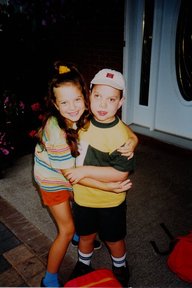 Drool in my hair, leftovers from lunch on my shirt, and a full heart. Big hugs from my not-so-little brother are my absolute favourite. He is the only person I know who loves without limits, and never holds back. His life the past 21 years has been a rollercoaster filled with ups and downs, but one thing about Nigel remains the same: he is simple and he is pure. Nigel was born June 3, 1993, a day that changed our family forever. Nigel has a very rare condition called “linear nevus sebeaceous syndrome.” I bet that 98 percent of the population has never even heard this term before, so I’ll explain Nigel the best way I know how. He functions at about the age of 2. He is nonverbal and needs 24/7 care, including feeding and diaper changes. He also suffers from severe epilepsy, and after one brain surgery, countless medication combinations, and a vagus nerve stimulator implant, I am sad to report he still seizures on a daily basis. Growing up with Nigel has been a journey, and our relationship has changed throughout the years. As a little girl, I really didn’t see what made him different. I just assumed everyone had a team of nurses, therapists and doctors when they were little… it takes a village doesn’t it? I got to spend lots of time with my granny and my aunt when Mom and Dad had to travel to appointments, but I never understood the seriousness of it all; I just thought everyone wanted to hang out me. When Nigel started at my school I remember being so excited. My little, adorable, brother was at MY school. I got hugs in the hallways and hugs at recess. He was my little security blanket that I knew I could go to when I needed some familiarity. Not to mention, everyone else thought that Nigel was pretty cool. I can remember other kids playing with him on the school yard and singing songs to make him laugh. Most of the time this made me smile, although I will admit I would often remind the other kids that he was MY brother, so you know… back off a bit. Our relationship got foggy when I entered into my teens. Things are so awkward during those years. I was rake thin, with braces and not-so nice skin. All I wanted to do was to fit in, and having a brother that was “different” didn’t help in that area. I hate to admit it, but I was embarrassed of my situation at home and I was scared of what other people would think. This went on for about four years. I would only invite certain friends over who knew about my “situation” and I rarely talked about Nigel with anyone but family. I went on to high school as did Nigel two years later. My parents made the decision to send him to a different high school for two different reasons. One was that the other school was smaller with a better Special Ed program, and the other was to give me my own space. I will always be grateful that they let me have my high school years on my own. As much as I love Nigel, I needed that space to grow. I can remember so clearly when everything changed. There were two separate events that completely dispelled all of that embarrassment stuff that haunted me during those puberty-infested years. I was probably about 16 when the first one occurred. I was in high school at the time in a family studies class. We were assigned a project where we were to address different issues that families faced. For some reason, I decided to do the project on my own family. I don’t know why, but I was determined to break the silence I had kept for so long. I can remember doing the presentation (and holding back tears while I did it), and at the end having people come up to me and say that all this time they had thought I was an only child. People were kind of shocked, but no one treated me any different. Progress. The second incident was not long after the ice-breaker moment. I was sitting with friends in the auditorium waiting for an assembly to start. A few students with special needs entered the gym with their EAs when I heard two students down from me say, “Here comes the retard parade.” I could literally feel my blood boiling and my hands shaking. I don’t think I had ever been that mad before. Without hesitation I leaned right over and gave that girl a piece of my mind. It was like the words were just spilling out of my mouth. I ran up one side of her and down the other. I really can’t remember everything I said, but I do know that something along the lines of “If you said that about my brother I would kick your a**” came out. She replied with “Oh sorry, I didn’t know.” From that day forward… everyone knew. How could I be embarrassed of someone so cool and so gosh darn cute? It was like I did a complete 180. Today I can describe my relationship with my brother as “unbreakable.” We have this bond that I don’t think anyone will ever understand. I love him more than anything in the world, and I would do anything for him. We spend lots of time together, laughing and singing and of course hugging.
I talk about him all the time. I share stories about him, I beam with pride when he does something totally amazing and fantastic like taking off his own shoe, and I am definitely not embarrassed. Although I do feel bad about my years of silence, I think that it was normal. I was pretty much embarrassed of everything back then (ask my mom!). Today I am a very proud sister, blessed with a very special brother (struggles and all). He has made me strong, he has taught me what true love looks like, and he has reminded me every day that life does not have to be perfect be wonderful.
1. This piano that can be played with your eyes:
Eye Play the Piano is a system that allows a person to play the piano without the use of the hands or arms. An eye-tracking device mounts on the player’s head and allows them to select keys to play using eyesight, blinking and head movements. Watch high school student Kota Numajiri using the system to participate in a school Christmas concert in the video below.
2. This anti-tremor spoon that helps people with Parkinson’s disease eat on their own:
The Liftware Base Stabilizer spoon was recently acquired by Google, according to The Associated Press. The utensil allows people who live with essential tremors or Parkinson’s disease to feed themselves and more comfortably eat on their own.
3. This app that’s helping kids with autism learn to make eye contact:
Some people with autism struggle to initiate and maintain eye-contact, so reading emotions of the people around them is more difficult. To help combat this problem, Samsung and a team of scientists developed an interactive camera app called Look At Me. The app encourages children to make eye contact with a parent or guardian through the use of the smart phone camera and helps keep them motivated through a points system, themed missions and various sound and visual effects.
4. This car that wheelchair users can roll right into:
Having spent her whole life in a wheelchair, Stacy Zoern, a former intellectual property lawyer in Texas, understood the need for increased mobility and independence. So she quit her job to start the Kenguru car company, which sells electric, lightweight cars that wheelchair users can easily wheel into. The small electric car is designed to go around 25 miles per hour, making it ideal for getting around town but not for busy highway travel.
Original article HERE
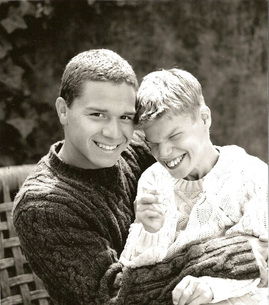 For my husband and I to get away on a little vacation, we had to arrange care for our 28-year-old son. Born with a diaphragmatic hernia discovered after a complicated birth, he suffered brain damage, leaving him with severe cerebral palsy. He’s our fourth son and our sixth and last child. His older siblings ranged in ages from 2 to 9 when he was born the beginning of the Christmas season, 1985. This new baby was just another brother in their eyes. My daughters still babied him and dressed him up in funny costumes. My sons wrestled and teased him, as he rightly deserved being the baby of the family. He was included in all family outings. We’ve had angel caregivers who have assisted us over the past 28 years — mostly people we knew from our church and my parents. We had a few young men who gladly took him to a basketball game or came off the bus with him from school and treated him like one of the gang. We had women I met who loved him as much as we did and wanted a little of his heaven to rub off in their arms. Mostly though, while growing up, his brothers and sisters took care of him if my husband and I wanted a date night. When we moved from the town he grew up in, we said goodbye to his peers and our friends. His buddies and our children graduated and went on to live their compassed lives. We found ourselves in a new city. He’d aged out of the school system, and we were all set to begin a new season of our life. We found caregivers hard to come by, and they didn’t stick around long even when they were great. It’s tougher for me to get away now, and his care is more difficult only because he’s matured into a young man, and we’ve matured into old people! Some have asked me about our plans for his care in the future. When I quickly and assuredly respond that his siblings will care for him, some have queried, “Is that really fair?” “Do you really think that should be their responsibility?” The questions are delivered in a learned tone, in a redundant fashion; mostly it’s a statement, not a true question. Trying to explain to others what his presence has added to our existence is impossible. By a stroke of luck, most of our children ended up living near us, and we’re blessed once again with their presence but even more by their babies. When we escaped this weekend, we dropped him off at our daughter’s home. Her 2-year-old rushed to the door, “Hi, TJ!” she said with as much excitement as if he were Santa. She asks where he is if she doesn’t see him for a few days. She wants gauze taped to her stomach like he has, and the other grandkids fight over who gets to push his chair and feed him. His loud startling laugh doesn’t bother them, and when it upsets another child at a store, they can’t figure out what the big deal is. My daughter, with her four children, gladly welcomed him to their home to continue the lesson on loving one another, serving one another, helping those who can’t help themselves and not fearing others who look different, sound different, and yes, slobber. My son and his wife stepped in to help on one of the days. Their 17-month-old loves to climb on his chair and grab his bent and spastic hands. She loves his soft hair and wants to kiss him. Is it fair? No, it’s not fair that others can’t have a built in angel like we do. Is it their responsibility? Yes, I think it is; just as we taught them to help the guy with the flat tire along the side of the road and the new family who just pulled up with a U-Haul that needs unloading and the widow who needs her lawn mowed and her gutters cleaned out. I’m blessed with a spouse and six souls, given to me for a short time to learn lessons here on earth such as how to love unconditionally, how to love others more than myself, and how to serve others to feel the love that we believe Christ has for all of us. Written by Rene' Steelman Read full article Here Like the Might on FB: Here 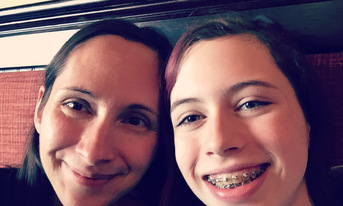 Invisibility. That’s the superpower that siblings of special needs kids cultivate. Even if they wanted a different one like being able to fly they would be stuck with invisible. It’s not a choice. It’s not that I don’t actually see my other children. And it’s not that I don’t try. It’s just that no matter how much effort and attention I give them Haley, by virtue of her diagnosis, needs more. We all sacrifice things for her. Whether it’s a family vacation because the medical bills are too much, or a trip to an amusement park because Haley can’t do the rides, or not participating in an after school activity because Haley has a Dr appointment. But one of the things that we don’t really acknowledge is sacrificed is our family dynamic. Our relationships with each other. In order to keep my older daughter’s life as normal as possible my husband and I do a lot of divide and conquer. The problem there is in the word divide. Because we can’t unite and conquer, it’s not really possible to plan for all of us to spend 6 hours at a swim meet. So we are left feeling like we are split shift parenting and just passing by one another most days. But it’s the only way to keep any semblance of normalcy for our children. And so we sacrifice the typical in favor of the workable. I have sacrificed the relationship that I thought I would have with my older daughter. Because of our divide and conquer approach I am typically taking care of Haley while my husband is running Emily around. They have a standing Father daughter dinner date on Friday nights after swim practice. There have been many moments that I regret missing, far too few of my own one on one moments with Emily. But it’s a sacrifice we are forced to make in order to make our family work. Haley’s older sister Emily is a compassionate, sensitive girl. She sees, really sees, people. She is the kind of girl who would never watch someone sit alone in the lunch room without going over and inviting them to join her. She’s the kind of girl who talks openly with me about the things that teens struggle with- body image, sexual orientation, dating- and has no shame about who she is, embracing her quirks and individuality with vigor. She is accepting of everyone as she tries to navigate the bumpy waters of being a teen with dignity and maturity and confidence. She is comfortable with herself in a way that some people never are. But I know that our moments together are too few. And I recognize that she is all of those things in part because of what she’s watched her sister endure. She’s also the same girl who once said that she wished she had an incurable illness so that we would pay as much attention to her as we do to Haley. And she’s the one who every time I say no will ask “because of Haley’s seizures?” Not knowing that it cuts a scar in my heart each time I let her down. She’s the one who has learned to ask before she eats the last of anything- is this for Haley? Because she knows that Haley can only have certain foods due to her diet therapy. She’s the one who has watched me prepare precise meals and treats for her sister every day while she has to settle for whatever Mom isn’t too tired to make. She’s also the one who will drop whatever teen thing she’s doing to read her sister a bed time story. She’s the one who lets her sister hang out with her and her friends more than most kids her age. She’s the one who when she hears us go rushing through the house will drop what she’s doing and rush to her sister too. She’s the one who will hold Haley’s hand as the seizure grips her body and she will echo my own words “It’s ok Haley bug. I’m here for you”. On the night of Haley’s first seizure, as Artie ran outside to help the ambulance find us, and I was on the phone with the 911 operator sobbing “please don’t let my daughter die, she’s not breathing”, Emily was the 8 year old girl left on her own to cry in the living room with no one to comfort her as I breathed air into her sisters mouth. She is the one who had no one to dry her tears as I was too busy putting my ear to Haley’s nose to see if she had resumed breathing. Emily is the one who went outside with the first policeman on the scene to see his car as he distracted her while the paramedics loaded her sister on a stretcher. She’s the girl I left behind that night to go with her sister. She’s the one who needed my care and comfort but went without because Haley needed me more. That was the night that Emily became one of the unseen- the sacrifices, the casualties- of special needs families that don’t get talked about often enough. The sibling. The girl who feels invisible. What I want to say most is I SEE you. Not just Emily, all of you. I see you. Even if you feel invisible, even if your sibling needs more, I hope to give you enough so that you know that you are seen. And loved. And I hope you know that I would give anything to take this from you, not just from your sister, but this burden of yours as well. You are not unseen, you are just unsung. The unsung hero sacrificing pieces of your own childhood and life to save your sister. I see that. I wish I could protect you from it, but since I can’t I hope you know I’m here and I see you. I see your fear and your love and all of you. Even when you think I’m not looking, I AM. You are not invisible to me. Original Article Here! 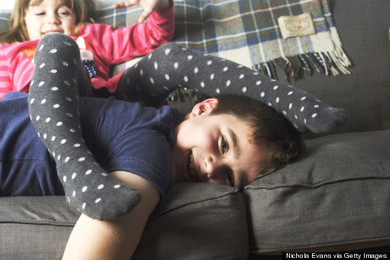 Remember that time when you drew on your sister's homework (textbooks included) and afterwards she still read your favorite bedtime story? Or that other time your brother gave your favorite doll a haircut? No? What about when he taught you how to ride a bike, or the time the three of you rode bikes to the nearest convenience store and bought boxes of mac and cheese to cook your parents a "gourmet" anniversary dinner? We're betting that you do. For most people, their relationships with siblings--or their sibling-like relationships -- will be the longest, and arguably the most important ones in life. Parents inevitably play less central roles as you get older, and spouses and children enter much later in life. Not many influences will have as lasting an impact on identity or life trajectory as a brother or sister's. 1. Lifetime Happiness: According to a university study, older adults with living siblings have a more positive attitude than those without. As people grow older, siblings remain life partners, in a sense. And as we encounter loss in various forms, siblings provide an unparalleled support system. A similar study reported that people in their golden years who also had sisters experienced depression less. This correlation appeared independent of the amount of time spent together, as long as there were perceived closeness and the "availability" of a sister. in fact, the role of the sibling is particularly important in instances of broken homes. Experts in the field have found that younger children with close sibling relationships aren't as lonely, exhibit more positive behavior and feel a greater sense of self-worth. One researcher found that siblings are often the second in line (even before fathers) among those whom children seek out for support in times of need. "During times of significant changes within or disruptions to the family dynamic, a sibling can often take on the role of the primary attachment figure during childhood ... at a time when the typical primary caregiver is less able to offer this," explains clinical psychotherapist Michelle Ambalu. 2. Identity Many studies have shown that sisters can have the greatest impact on their siblings. For example, men who have sisters tended to be more "emotionally secure," and women with sisters were "encouraged and inspired in their social roles." Sorry brothers, you don't seem to have quite the same effect. A large portion of siblings seem to adopt one another's habits and behaviors. In a case study conducted by Richard Rende, a professor at Brown University, Rende provided pairs of siblings cell phone–like devices that prompted them to report their activity periodically throughout the day. The siblings seemed to be "ghosting" one another in their behaviors, supporting Rende's theory that siblings (especially younger ones) tend to mirror their counterparts (older siblings). On the other hand, there are moments when siblings act like repelling magnets, choosing opposite life paths. Occurring most commonly with siblings closer in age,de-identification occurs as one stakes out an inner-home identity different from his or her sibling, which results in an identity very different from his or her brother or sister. 3. Social Skills If you're a woman with a brother, or a man with a sister, you can thank your sibling for your comfort level around the opposite sex. Those with siblings of the opposite gender are at an advantage because they had more interaction with the other gender growing up; the other sex doesn't seem as mysterious outside the family context. In aUniversity of Texas-Arlington experiment, college students with an opposite-gender sibling initiated conversation sooner and continued it with more ease than others did. As children, altercations between siblings are inescapable and frequent. When one researcher observed the excessive conflict (fights which were helped along in the name of science) between young siblings at home and then followed the behavior of each individual in their preschool a year later, he found these individuals were better at conflict resolution than their classmates. Because siblings are stuck with each other for better or worse, the ability to settle disputes develops early. According to Ambalu, the clinical psychotherapist, even the playful teasing among siblings can encourage our ability to build connections and relationships with other peers. "Teasing can be a good way to remedy or normalize a slightly clumsy social interaction," she says. "It allows for a healthy expression of fondness and a bit of aggression all in one and to see the impact we have on one another." While siblings provide a built-in social structure, children without siblings are not at a complete loss. They engage with friends more and develop their social skills from interactions with peers in school or extracurricular activities. So whether you have one sibling, seven, or even none, these types of relationships are integral to development. Next time you see your eldest child teasing the younger, consider taking a step back and let nature take its course. Original article HERE 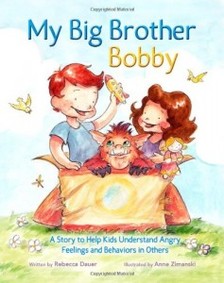 Being angry, seeing red, meltdowns, and freaking out are just a few words we have to describe what happens when a person loses control of themselves. My Big Brother Bobby: Understand Angry Feelings and Behaviors of Others by Rebecca Dauer helps siblings, classmates, friends and other family members to understand children who struggle with emotional and behavioral problems. For some of our children their lives or their environment become overwhelming. They just can’t deal with all the sensory bombardments and may act out, withdraw, become emotional, run, etc. My Big Brother Bobby is a fun, imaginative story that educates children on the importance of understanding and coping with anger in others in a warm and easy to understand way. It isn’t your typical children’s book. It is more of a communication bridge between parents, social workers, OTs, psychologists and children who are dealing with emotional issues, specifically those living with siblings with angry outbursts. Rebecca’s blog is a wealth of information about siblings of children with special needs. We thank Rebecca Dauer for her guest post introducing her book and agreeing to take part in our Author Interview Series. Lorna: Congratulations of your book, My Big Brother Bobby: Understand Angry Feelings and Behaviors of Others. What is the story behind this book? Why did you think a book on this topic was needed? <<Rebecca Dauer: The story behind the book is loosely based on stories from friends and family as well as my personal experiences. When I was younger, there was very little materials or outlets for siblings and I felt the need to change it. After doing research for the book, I found an immense amount of support from the sibling community. Everyone can relate to this book, whether it is a parent, sibling, cousin or friend who has a monster in their belly, it is hard on everyone and especially for young children. I wanted to bring to light the real struggles and emotions that children have and to bridge the communication gap for parents and health professionals.>> Lorna: You and the illustrator, Annie Zimanski, make a very good team. Annie’s illustrations bring your story to life! Usually how does the author of a picture book work with the illustrator? It seems to me there is a lot of communication that most go on to finish with a beautiful book like My Big Brother Bobby. <<Rebecca Dauer: Great question! I found Annie on elance.com after searching through several children’s book illustrators. I loved her work and she related well to the book. The first step in the process is to understand the story and then, creating the characters in the right medium. For example, they could look digital, acrylic or have a soft pastel look. Each change of color, character and background give a different look and feel to the book. Once the characters are built, then you break down each illustration by page with a sketch. Once each page is sketched and tweaks have been made, full color and background detail is added. Then there are a few final edits and that’s it! I enjoyed working with Annie and would recommend her to anyone looking for a great illustrator.>> Lorna: Is this your first book? You chose to self-publish it. What advice do you have for other authors who are thinking of self-publishing their book? <<Rebecca Dauer: Yes this is my first book. Self-publishing is a bit more streamlined and inexpensive because you don’t need an agent or wait until you are signed. If you have a PDF version of your book, you simple buy an ISBN and upload online. I used CreateSpace through amazon where books are purchased on demand. I was also able to add the book to the app store. I also became a member of the Independent Book Publishing Association (IBPA) for its resources and helpful guides into the publishing world. I recommend using those, becoming a member of IBPA, creating a website and promoting through social media.>> Lorna: In your book you mention a support organization for siblings, Sibling Leandership Network and the Sibling Support Project. Please tell us what they offer siblings. <<Rebecca Dauer: The SLN and the Sibling Support Project are completely dedicated to helping the siblings of children who are physically or mentally disabled. The SLN provides siblings of individuals with disabilities the information, support and tools to advocate for their brother or sister to promote the issues important to them and their entire family. They are also very involved in policy and advocacy. The Sibling Support Project headed by Don Meyer (who wrote a review for my book) is a national effort dedicated to the life-long concerns of brother and sisters of people who have special health, developmental, or mental health concerns. Sibshops are International and give children a community-based peer support program and provide awareness of siblings unique, lifelong, and ever changing concerns through workshops, websites, and written material. It is an amazing community and organization. If you would like more information, please visit below: -To keep reading the article please click: HERE 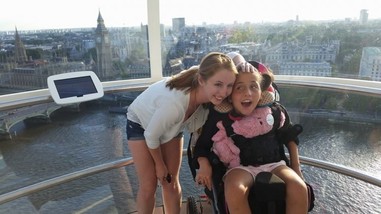 To my fellow siblings of children with special needs: I’m going to give you some unsolicited advice. But first, let me start by saying I’m the proud older sister of a beautiful 12-year-old girl with a severe physical disability. Though I’m nearly eight years her senior, my sister, Lexi, is my best friend. Since her birth, my family’s path has been a little bumpy, but I feel blessed to have Lexi in my life every day. I don’t think for a minute that my experiences with Lexi give me any license to comment on your life or your feelings. I’ve spent many years trying to explain to parents that even they cannot truly understand what it’s like to be the sibling of their child with special needs. The relationship between a parent and a child is so different from the one between two siblings. I’d be entirely hypocritical to suggest it’s not difficult to be the parent; I’m awestruck by the strength of my mom and dad every day. But my parents cannot understand what it’s like to be Lexi’s sister any more than I can understand what it’s like to be her mom or dad. In the same fashion, I cannot understand what it’s like to be your sibling’s sister any more than you can understand what it’s like to be Lexi’s. But I do like to think my past 12 years of both angst and joy with my sister have left me with some insight into living in the world of disabilities. So I’m going to share with you a few things I think are important for every sibling of a child with special needs to know. Your life will be hard. You know this, obviously, but I still think it’s a critical to acknowledge this. Countless doctors, physical therapists, family friends, and, occasionally, even strangers in the middle of the grocery store have told me the hard times are nothing compared to the knowledge and inspiration I will gain just from being Lexi’s sister. I love Lexi more than anything in the world, but being her sister straight up sucks sometimes. It’s more than feeling a pang of jealousy or worry in my heart, and it’s more than the frustration that comes with constantly preoccupied parents. For me, it’s the devastating injustice of having my college fund drained to pay off medical bills. It’s the crippling guilt that comes with watching my mom struggle to take care of my sister when I leave for school. It’s an undying commitment to take care of a child who isn’t mine to take care of. I don’t want you to get the wrong idea because I wholeheartedly believe it’s all worth it. I wouldn’t trade Lexi for anything or anyone. But I also think it’s so important for you to know that it’s OK to feel like disabilities suck sometimes. It’s OK to be jealous and resentful and guilty. It’s OK to be tired of hearing about healthcare and insurance, and it’s OK to wish your life was easier. I certainly feel that way sometimes. To read more click here: http://themighty.com/2015/01/to-my-fellow-siblings  When Kyle got married to Jess recently, his brother Korey was his best man. When it came time for Korey to deliver the toast, a video played instead. Because of his Cerebral Palsy, though, Korey can’t deliver the speech that the best man would normally give at this point in the festivities. But Kyle has always been there for him, whether as his legs… or his voice and it wasn’t going to be any different today. Watch as Korey makes Kyle read his own tearjerking best-man speech.You really have no hope of not crying, but don’t worry — you’ll laugh, too! Original Post: http://twentytwowords.com/best-man-with-cerebral-palsy-makes-his-twin-brother-read-his-own-best-man-speech/?weekend 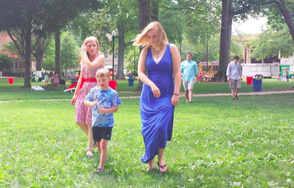 There are many misconceptions floating around about Down syndrome, people with Down syndrome and their families. In my experience, the idea that having a sibling with Down syndrome is nothing but burdensome or unfair is one of these huge misconceptions. Just as every individual is unique with or without Down syndrome, every family dynamic is unique. My story might not be in line with every sibling to a person with Down syndrome, but I believe many of us having more than a few of these qualities in common. 1. We are understanding. In 2011, Dr. Brian Skotko found in study conducted at Children’s Hospital Boston, “among siblings ages 12 and older, 97 percent expressed feelings of pride about their brother or sister with Down syndrome and 88 percent were convinced they were better people because of their sibling with Down syndrome.” While my situation is different — I’m 15 years older than my brother and now an adult living away from home — learning to become a good sister to John and good daughter to my parents facing their newborn’s Down syndrome-associated heart defect in the midst of my temperamental teenage years helped me to become a better, more compassionate and accepting person. I hear parents and expectant parents of children with Down syndrome worry that their other children will somehow be scarred by the redirection of their focus to their child with developmental differences. Again, the emotional needs of a 15-year-old are different than those of a younger child; but, personally, I would rather feel valued for being a compassionate and caring person and helper than given undivided attention and exclusive use of my parents’ time and resources. My parents did a good job expressing their appreciation for the help and empathy my sister and I contributed. 2. We Don’t Have It All Together Just because we tend to feel more accepting and have a lot of practice in patience doesn’t mean our family is any less crazy than yours. Additionally, though we may have learned different communication techniques to interact with our sibling based on his or her unique needs, we still drive each other up the wall sometimes. My parents like to joke that sometimes you wouldn’t know my sister and brother are 12 years apart; they annoy each other like they’re much closer in age. My sister loves to tap my brother’s iPad games over his shoulder, and he loves to break into her room and jump on her bed. We’re just like any other family, and we have the same kind of relationship with our sibling with Down syndrome that we do with our typical siblings. 3. We Have Strong Families Maybe this is specific to my family, but from what I’ve observed, it seems common in the Down syndrome community. Part of it could be our desire to ban together to provide the best support for our loved one with Down syndrome as we tackle unique challenges together. My brother has helped our family to form a stronger bond, a sense of community and belief that we’re all in this together. We do everything in our power to support and protect each other, whether it be from outside negativity, inner self doubt or a system that just isn’t doing enough to provide resources that our family needs. I also feel particularly fortunate to have a brother who expresses happiness so freely. When John is happy, which is often, he will tell you, he will jump and laugh and insist, rather stubbornly sometimes, that you laugh along with him. This determined purpose to support one another combined with the continual happiness check-ins from my brother has helped our family develop a culture of joy. 4. We Worry About Our Loved Ones When John was born, he was diagnosed with Atrioventricular Valve Defect (AVS), a serious heart condition which required surgery, and by the time he was 6 months old, he’d undergone two serious heart surgeries — one to reconstruct his heart to function properly and the second time to install a pacemaker after he went into cardiac block. He’s now doing fantastic and doesn’t even need to use his pacemaker, but these memories stay with us. Life-threatening medical complications can happen to anyone, and when something like this does hit that close to home, it’s nearly impossible not to be changed and have a stronger appreciation for how little control we have over our lives and those around us. I worry especially because certain diseases like leukemia and Alzheimer’s pose a greater than average risk to people with Down syndrome, and I can’t bear to think of my brother so fragile again. I also worry about my parents because of how much my brother needs them. I need them, but if anything were to happen to them, John would be my responsibility. I would gladly take care of him, but I just can’t imagine how difficult it would be for all of us emotionally. How could I possibly explain something like that to him? I also worry about everyone’s mental and emotional health. There’s a lot of stress involved with raising a child with special needs in a society that doesn’t accept them fully. I know we all love this journey in our family, but it can also take its toll on my parents when there are so many questions yet to be answered and so many resources we still have yet to find. Then there’s bullying. I pray from the bottom of my heart that my brother never has to face bullies, but I know that it’s realistically an issue for any kid, especially one seen as different. We have so far to go. 5. We Want You to Know About Us I never hide my brother’s story or my family’s story. It’s important to me and an integral part of who I am, and I want people to know that about me. I want people to be aware of my brother and the challenges he faces and the abilities he has so our society will change its attitude towards people with Down syndrome or other intellectual and developmental disabilities. I want people with typical children to make an effort to teach their kids about children and adults with special needs. We want awareness so we can break down the irrational and unfounded fear of the unknown associated with disabilities. To read more CLICK HERE: http://themighty.com/2014/11/10-things-siblings-of-individuals-with-down-syndrome-wish-you-knew/ 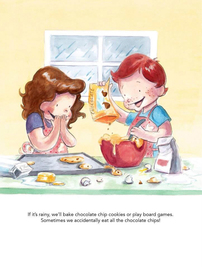 What inspired you to write My Big Brother Bobby? I wrote My Big Brother Bobby because there was a need for a book solely dedicated to young siblings of children who struggle with their tempers and have strong emotions. My goal is to reach as many children as possible. My hope is for children to relate to the characters, know that they are not alone and there are many resources available to them. I hope this book provides an outlet for conversation and understanding for all parties involved. Siblings of children who require special care especially those that struggle with anger often times don’t get the help they need until they are older. By then, it is harder to help. This book lets parents teach their children about their family dynamic at an early age in an easy to understand way. Can you give us an overview of the story? My Big Brother Bobby is story about a little girl with a big imagination and an even bigger heart. She loves to play with her brother Bobby but sometimes when he gets angry, something larger than life appears. My Big Brother Bobby is a fun, imaginative story that educates children on the importance of understanding and coping with anger in others in a warm and easy to understand way. It isn’t your typical children’s book. It is a communication bridge between parents, social workers, OTs, psychologists and children who are dealing with emotional issues, specifically those living with siblings with angry outbursts What lessons do readers learn from reading your book?_ That it is okay to be scared and there are easy ways to feel safe in a scary situation. Most kids feel like they are alone and to have a story that depicts what they are going through will help them learn to be more comfortable in their surroundings. "My Brother Bobby" teaches us that it is okay to be scared and that there are easy ways to feel safe in a scary...Click To Tweet Who’s your illustrator and why was she perfect for capturing the spirit of your book? Anne Zimanski is an illustrator living in Michigan. She has a bachelor’s degree in illustration and a background in both graphic design and fine arts. Who are your ideal readers? The ideal readers are children ages 5 and up. It is also a great resource for health professionals and educators working with children. How do you see your book being used? Ideally, I would like the book to be used for professionals and educators working families with a child who is physically or mentally disabled. This book helps the siblings of those children bring to light their experience and give another perspective on how the other sibling feels. Can you share one of your favorite moments or comments you received from a reader or a parent? A few months back, I heard from a Mom where the book has made a lasting impression not only on their kids, but also the parents. A mother wrote in and expressed her gratitude for the book. She explained that her older son had some anger issues and her younger son was bearing a burden because of his outbursts. She went through the book with her younger son and was in tears after hearing him respond to the questions in the back of the book. He explained how hurt and scared he had been by his brother’s outburst. When the other son read it (the one with anger issues) was able to get a better understanding to how his actions affect his loved ones and the ones around him. Since reading the book, they talk more openly about their feelings and take time to do special actives with each child. Leave us with some final words of inspiration. "Stand up for those who cannot stand up for themselves." Special thanks to Jodi Murphy! Click here to see the original article: http://geekclubbooks.com/2014/10/my-big-brother-bobby-understanding-anger/ |
AuthorRebecca is an independent publisher working to help siblings of children with emotional challenges. Archives
April 2017
Categories
All
|
My Big Brother Bobby: A Story to Help Kids Understand Angry Feelings and Behaviors in Others
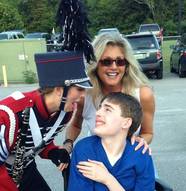
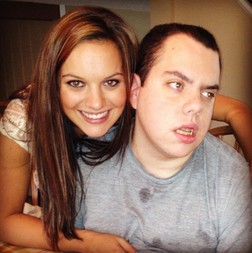
 RSS Feed
RSS Feed
